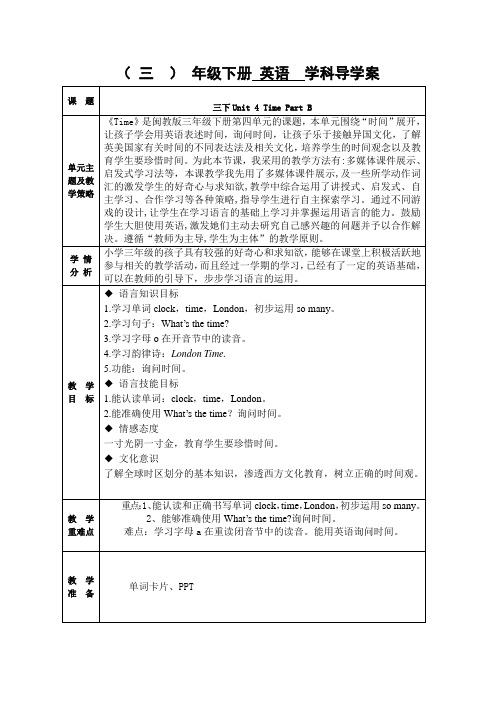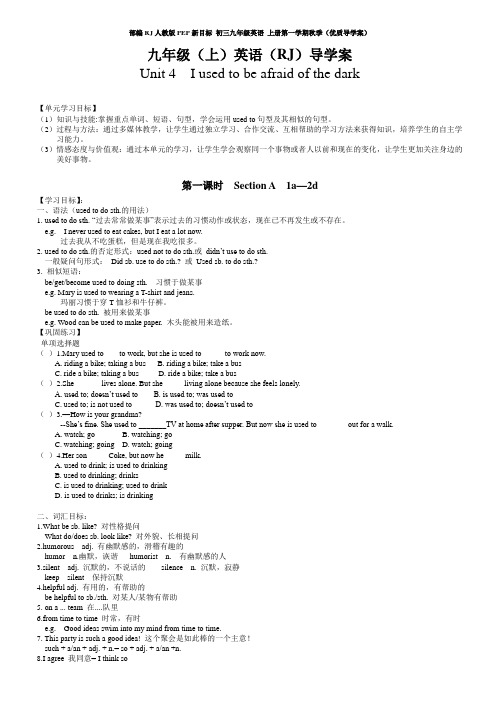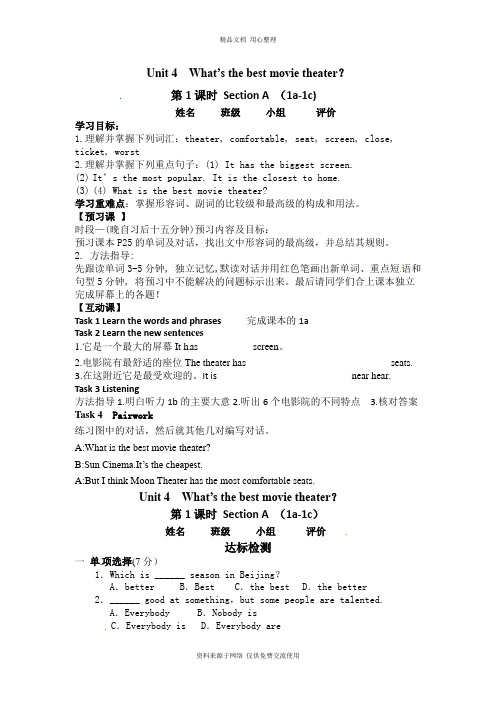新Unit 4导学案3
人教版七年级英语上unit4-导学案(知识点解析)

Unit 4 Where’s my backpack?Where’s my backpack? 我的背包在哪里?Where 是疑问副词,意为“在哪里,在什么地方”,引导特殊疑问句。
句型:Where + is\are +主语(人或物)?答语:主语(人或物)+ is\are +方位介词。
如:-Where is Gina? -she’s in the classroom.注意:Where is 可以缩写成Where’s,Where are可以缩写成Where’re.翻译短语1.在沙发上_______2.在床下___ _____3.在我背包里__________4.在桌上________5.under the chair___________6.on the dresser________ _7.in the drawer__________一、选择填空。
( )1. ___________ is your new pencil case? It’s in the bag.A. WhatB. WhereC. HowD. Who( )2.Is he Jack Smith? _________________.A. Yes, he’sB. Yes, it isC. Yes, he isD. No, it isn’t( )3.The boys are ___ the tree.A. onB. inC. toD. for( )4.-Where are Lucy’s friend? -___ in the room.A. TheyB. They isC. ThemD. They are( )5.Are these Dave’s CDs?_________________________.A. Yes, these areB. No, they areC. Yes, they are二.句型转换。
1.My backpack is under the sofa.(对画线部分提问)_________________________ 2.His books are on the sofa.(改为一般疑问句)______________________________ 3.Are your books on the table?(作否定回答)________________________________ 4.Her brother is in the tree.(对画线部分提问)________________________________ 5.My pens are in the drawer.(改为否定句__________________________________6. Are those your books? (改为单数形式)____________________________________7. She is my sister.(改为复数形式)_______________________________________ ((Section A 2a-4))(2) 表示方位的介词或短语还有:In(在...里面), under(在…下面), behind(在…后面), in front of(在…前面),next to(在…隔壁), between…and…(在…和…之间)一.根据汉语意思,完成下列句子。
九年级Unit4Iusedtobeafraidofthedark导学案SectionB3

Unit 4 I used to be afraid of the darkSection B3 (3a-3b)【学习目标】1. 学习并掌握生词general,introduction。
2. 复习used to的用法;能够表达自己现在和过去在外表、性格、爱好等方面的变化。
3. 能写简短文章、正确利用时态来描述自己或他人的变化。
4. 综合使用used to结构、一般过去时和一般现在时谈论自己在外貌、性格和爱好方面的变化。
5. 明白事物是在不断发展、变化的道理,培养学生积极向上的心态。
珍惜父母及亲人的爱,努力学习回报社会。
【重点和难点】【学习重点】used to结构的运用。
【学习难点】综合使用used to结构、一般过去时和一般现在时谈论自己在外貌、性格和爱好方面的变化。
【课前预习】一.理解以下生词general: 1. adj. 大体的;综合的, 2. n. 将军; 3. generally speaking 总的来说introduction:n. make an introduction二. 选择恰当的单词并用其适当形式填空。
Asia, silence, help, exact, self-introduction, proud, European, Africa1. We can find pine-trees (松树) in most ___________ countries.2. It might be very ________ if you get advice from a close friend.3. China is the host (主办国) of the Eleventh _______ Games.4. She told me the whole story ______ as it happened.5. Nile is an _______ river. It flows into the Mediterranean Sea(地中海).6. The house was very _____ because everyone was asleep.7. Thanks for your invitation. Allow me to make a _________ now.8. He was the ______ of the village after winning the championship.【合作探究】探究一、单元写作目标本单元的话题主要是介绍人物各方面的变化,包括外貌、性格、心理、学习、人际交往等方面,要求能正确使用used to结构描述一个人过去的外貌、性格、爱好等;能正确使用still,not…anymore,no longer,always,really,quite,so,never,seldom等词汇来表达变化的程度。
三年级英语Unit4 Time PartB导学案

(三)年级下册英语学科导学案板书句子What’s the time?并教学。
(4)游戏——走走停停看时间。
游戏规则:教师拿着卡通纸板钟绕着班级走,边走边拨动钟面。
全班学生不间断地提问:“What’s the time?”教师在一位学生面前停下,这位学生就要接过卡通纸板钟,看着钟回答:“It’s...o’clock.”答对的学生所在的小组得分。
(5)文化渗透。
普及全球时区划分的基本知识,树立正确的时间观。
(二)课文教学1.教授句子:It’s eleven o’clock in Beijing.和It’s three o’clock in London. (1)教师指着黑板上标有Beijing的钟面,对学生说:“It’s eleven o’clock in Beijing.”板书句子并教学。
(2)教师指着黑板上标有London的钟面,对学生说:“It’s three o’clock in London.”板书句子并教学。
2.请全班翻开课本第25页,教师播放课文录音,学生跟着录音模仿说句子。
3.再播放课文录音二到三遍,采用全班学生跟读、个别学生或小组跟读的形式学习对话内容。
(三)语音教学1.复习字母o在重读闭音节中的读音。
(1)教师播放课本第24页第3部分的录音,让学生跟读单词dog,stop,pencil-box,引出字母o发/D/的音。
(2)教师出示单词dog,stop和pencil-box,由学生自主拼读。
2.学习字母o在开音节中的读音。
(1)教师出示单词no,让学生感知单词no中字母o的读音,引出字母o 发//音的教学。
(2)教师出示单词go,nose和home,学生尝试拼读。
(3)请学生翻开课本第26页,教师播放录音,学生模仿跟读。
3.游戏——耳力大比拼。
游戏规则:教师将dog, stop, pencil-box, go, nose和home六个单词随机两两配对,并朗读,让学生判断字母o在这两个单词中的读音是否相同。
部编RJ人教版PEP新目标 初三九年级英语 上册第一学期秋季(优质导学案)Unit 4 导学案

九年级(上)英语(RJ)导学案Unit 4 I used to be afraid of the dark【单元学习目标】(1)知识与技能:掌握重点单词、短语、句型,学会运用used to句型及其相似的句型。
(2)过程与方法:通过多媒体教学,让学生通过独立学习、合作交流、互相帮助的学习方法来获得知识,培养学生的自主学习能力。
(3)情感态度与价值观:通过本单元的学习,让学生学会观察同一个事物或者人以前和现在的变化,让学生更加关注身边的美好事物。
第一课时Section A 1a—2d【学习目标】:一、语法(used to do sth.的用法)1. used to do sth. “过去常常做某事”表示过去的习惯动作或状态,现在已不再发生或不存在。
e.g. I never used to eat cakes, but I eat a lot now.过去我从不吃蛋糕,但是现在我吃很多。
2. used to do sth.的否定形式:used not to do sth.或didn’t use to do sth.一般疑问句形式:Did sb. use to do sth.? 或Used sb. to do sth.?3. 相似短语:be/get/become used to doing sth. 习惯于做某事e.g. Mary is used to wearing a T-shirt and jeans.玛丽习惯于穿T恤衫和牛仔裤。
be used to do sth. 被用来做某事e.g. Wood can be used to make paper. 木头能被用来造纸。
【巩固练习】单项选择题()1.Mary used to ___ to work, but she is used to _____ to work now.A. riding a bike; taking a busB. riding a bike; take a busC. ride a bike; taking a busD. ride a bike; take a bus()2.She ______ lives alone. But she_____ living alone because she feels lonely.A. used to; doesn’t used toB. is used to; was used toC. used to; is not used toD. was used to; doesn’t used to()3.—How is your grandma?--She’s fine. She used to _______TV at home after supper. But now she is used to _______ out for a walk.A. watch; goB. watching; goC. watching; goingD. watch; going()4.Her son _____Coke, but now he _____milk.A. used to drink; is used to drinkingB. used to drinking; drinksC. is used to drinking; used to drinkD. is used to drinks; is drinking二、词汇目标:1.What be sb. like? 对性格提问What do/does sb. look like? 对外貌、长相提问2.humorous adj. 有幽默感的,滑稽有趣的humor n.幽默,诙谐humorist n. 有幽默感的人3.silent adj. 沉默的,不说话的silence n. 沉默,寂静keep silent 保持沉默4.helpful adj. 有用的,有帮助的be helpful to sb./sth. 对某人/某物有帮助5. on a ... team 在....队里6.from time to time 时常,有时e.g. Good ideas swim into my mind from time to time.7. This party is such a good idea! 这个聚会是如此棒的一个主意!such + a/an + adj. + n.= so + adj. + a/an +n.8.I agree 我同意= I think so表示不同意时用I don’t agree 或I disagree9.It’s been three years since we last saw our primary school classmates.自从我们上次小学同学见面以来已经有三年的时间了。
七年级英语下册第四单元Unit 4 导学案

Unit 4 Don't eat in class 第1课时section A 1a—1c学习目标掌握10个单词:rule arrive be on time hallway hall dining listen listen to fight sorry2、掌握并灵活运用句型:What are the rules? Don’t do sth. We can (not) do sth3、能应用所学知识进口语交际学习重点:能应用所学知识进口语交际学习难点:能掌握祈使句的否定句形式学法指导:自主学习交流合作听力训练对话操练学习过程:任务一:自我预习:根据音标读出1a---1c的单词熟读1a 的词组并翻译成汉语。
1. Don’t arrive late for class.2. Don’t run in the hallway.3. Don’t eat in the classroom.4. Don’t listen to music in the classroom or the hallway.5. Don’t fight.fight的用法:1)v. 打架,争吵。
构成词组:①fight for….②fight against….③fight with….2)n. 打架:have a fight 打架。
任务二完成1a1、谈论图片,说出他们在干吗?A: What are they doing? B: They’re fighting.A: What is she doing? B: She is . A: What is he doing? B: He is .2、完成任务(将校规的数字写在学生的旁边)任务三听录音完成1b听力任务1、1b是关于的对话,熟读该对话找出表示规则的用语。
2、比较Don't arrive late for class.和We can't arrive late for class. 的异同。
新人教版初中英语八年级上册Unit 4 导学案

Unit 4 What’s the best movie theater?第1课时Section A (1a-1c)姓名班级小组评价学习目标:1.理解并掌握下列词汇:theater, comfortable, seat, screen, close, ticket, worst2.理解并掌握下列重点句子:(1) It has the biggest screen.(2)It’s the most popular. It is the closest to home.(3)(4) What is the best movie theater?学习重难点:掌握形容词、副词的比较级和最高级的构成和用法。
【预习课】时段—(晚自习后十五分钟)预习内容及目标:预习课本P25的单词及对话,找出文中形容词的最高级,并总结其规则。
2. 方法指导:先跟读单词3-5分钟, 独立记忆,默读对话并用红色笔画出新单词、重点短语和句型5分钟, 将预习中不能解决的问题标示出来。
最后请同学们合上课本独立完成屏幕上的各题!【互动课】Task 1 Learn the words and phrases 完成课本的1aTask 2 Learn the new sentences1.它是一个最大的屏幕It h as ____ ____ screen。
2.电影院有最舒适的座位The theater has ________ _________ _______ seats.3.在这附近它是最受欢迎的。
It is ________ ________ ________near hear.Task 3 Listening方法指导1.明白听力1b的主要大意2.听出6个电影院的不同特点 3.核对答案Task 4 Pairwork练习图中的对话,然后就其他几对编写对话。
A:What is the best movie theater?B:Sun Cinema.It’s the cheapest.A:But I think Moon Theater has the most comfortable seats.Unit 4 What’s the best movie theater?第1课时Section A (1a-1c)姓名班级小组评价达标检测一单项选择(7分)1.Which is ______ season in Beijing?A.better B.Best C.the best D.the better2.______ good at something,but some people are talented.A.Everybody B.Nobody isC.Everybody is D.Everybody are3.—Which is______,the sun,the moon or the earth?—Of course,the moon is.A.biggest B.the biggestC.smallest D.the smallest4.There is a good clothing store__________A.in the town B. on the town C. in town D. on town5.Who jumped the _______of all in the long jump ? Li Lei did.A. longerB. longestC. farther D . farthest6.He is__________ his father.A. as tallerB. the taller thanC. as taller thanD. taller than7. -Which is ________season in Beijing?-I think it’s autumn.A. goodB. betterC. bestD. the best二.单词拼写。
新教材高中英语Unit4 PeriodⅢDevelopingideas导学案外研版选择性必修第一册

Period ⅢDeveloping ideas课前自学导引ART & TECHNOLOGYThink “art”. What comes to your mind? Is it Greek or Roman sculptures in the Louvre, or Chinese paintings in the Palace Museum? Or maybe, just maybe, it's a dancing pattern of lights?The artworks by American artist Janet Echelman look like colourful floating clouds when they are lit up at night. Visitors to one of her artworks in Vancouver could not only enjoy looking at it, they could also interact with it—literally. They did this by using their phones to change its colours and patterns. Exhibits such as these are certainly new and exciting, but are they really art?词汇自测①literally adv. 根据字面意思②look like 看上去像③light up 点亮④interact with 与……互动艺术与科技想一下“艺术”,你想到了什么?是卢浮宫里的希腊或罗马雕塑,还是故宫里的中国画?或许,只是或许,是一个舞动的灯光图案?美国艺术家珍妮特·艾克曼的作品在晚上点亮时看起来就像五颜六色的浮云。
游客们参观她其中一件在温哥华的艺术品时,不仅可以欣赏它,还可以与它进行“互动”——就是字面意思上的互动。
七年级上英语人教新目标版Unit4导学案

Unit 4 Where’s my schoolbag? Section A(1a—2c) 课时1班级:姓名:学号:【学习目标】一、Words: where; table; bed; bookcase; sofa; chair;二、方位介词:in; on; under; behind; in front of; in the front of; nearnext to; between..and…; beside;三、Main sentences: --Where is the schoolbag? --It’s under the table.--Are the keys on the sofa? --No, they aren’t. They’re on the table.四、Talk about the things of your room. Tell where they are.【自主探究】一、幻灯片展示,引出新单词,并教读新单词。
然后完成下列各题。
1. I have two pens. They are on my (书桌).2.—(在哪里) are your keys, Lucy? --In my bag.3.—Is her notebook on the (桌子)? --No, it’s on the (椅子).** have some books in the (书柜).** little cat is (在….下)the bed.二、Complete Activity 1a and 1b, then translate the phrases.在桌子上在书包里在床底下在书柜里在书桌下在沙发上三、方位介词的学习:(1). in在……里面:铅笔在文具盒里。
(2). on在……上面:树上有些苹果。
(3). under在……下面/正下方:你书桌底下是什么?(4).behind在……之后:树后有一辆自行车。
- 1、下载文档前请自行甄别文档内容的完整性,平台不提供额外的编辑、内容补充、找答案等附加服务。
- 2、"仅部分预览"的文档,不可在线预览部分如存在完整性等问题,可反馈申请退款(可完整预览的文档不适用该条件!)。
- 3、如文档侵犯您的权益,请联系客服反馈,我们会尽快为您处理(人工客服工作时间:9:00-18:30)。
Unit 4 Why don’t you talk to your parents?
Section B 1a-2b(第3课时)
【学习目标】
1.知识目标:new words and phrases
2.能力目标阅读策略(guessing the meaning)
【学习重难点】
2b中的短语和搭配
【导学过程】
从课文中找出下列短语
1.给...压力
2.与…竞争
3.与…作比较
4.足球训练
5.典型的美式家庭
6.孩子的发展
7.push ...hard 8. In one’s opinion
9.造成压力______________ 10.校外辅导班______________
【知识链接】
1.继续、持续做
keep (on)doing;go on doing ;continue doing
若将doing 换成to do,则指继续去做另一件事
pare to 把...比作.../compare with把...与...对比
Life is poetically compared_______ the morning dew.
在诗歌中,人生被比喻为朝露。
Compared ________western countries, China uses materials very carefully.
和西方相比,中国使用物资很节省。
2.develop动词;它的名词是________;
形容词有两种:developing(发展中的)developed(发达的);
试译:发展中国家___________________发达国家______________
【合作探究】
一、选出正确的句子,使对话通顺
W: Alice, help me!_________
A: Hey, Wei Ming. Although you may be unhappy with your parents, you should talk to them.__________
W: It’s because they want me to get good grades.
A: ___________Free time activities like sports and hanging out with friends are important, too. W: I totally(完全地) agree. I need more free time to do activities I enjoy.
_______________________________________________________
A: Yes, you won’t get good grades if you’re stressed out all the time.
W: I also keep worrying about getting better grades than my classmates.
A: Oh, ____________You should all be helping each other to improve.
W: You’re right. Thanks f or all the good advice, Alice.
二、根据句意和首字母提示填空。
1. I’m going to give my brother a football as a birthday p_________.
2. With his help, I have made great p________ in my subjects.
3. My grandma is n_______ eighty years old, but she is very healthy.
4. Tom likes coffee r________ than tea.
5. Could you hear me c________?
B) 用所给词的适当形式填空。
6. There are a lot of __________ (mouse) in the house.
7. My father made the _________ (suggest) that I go there by bike.
8. Many people in China have _________ (person) computers at home.
9. The little baby fell _________ (sleep) soon after the music began to play.
10. Who is the _________ (win) of the game?
【巩固练习】
一.选择填空
1. Maybe you should __________ .
A. call in her
B. call up her
C. call her up
2. Brian doesn’t like __________ . A. reading B. read C. reads
3. Yesterday I went to the library. Henry went there, ________ .
A. either
B. too
C. also
4. Charles’ cousin is the same age ________ him. They get on well ______ each other.
A. as, with
B. as, on
C. as, in
5. _______ he’s old, he can still carry this heavy bag.
A. Though
B. Since
C. For
6.. I hurried _____ I wouldn’t be late for class.
A. since
B. so that
C. unless
7.The teacher raised his voice _______ all the students could hear him.
A. for
B. so that
C. because
8 .We won’t start ______ Bob comes. A. until B .if C. unless
二.根据课文内容完成句子
1.父母在学习上给我太多压力。
My parents _________ me too much ________ about school .
2.他们总是把自己的孩子和别的孩子比。
They are always __________ _their children _____others.
3.太多的压力对孩子的发育不好。
Doctors say too much pressure isn’t good for ________ __________.
4.人们不该把孩子逼那么紧。
People ______ _______ their kids so_______.
5.生活不应当只是成绩
Life shouldn’t just __________ _______ grades.
反思_________________________________________________________________________ _____________________________________________________________________________。
